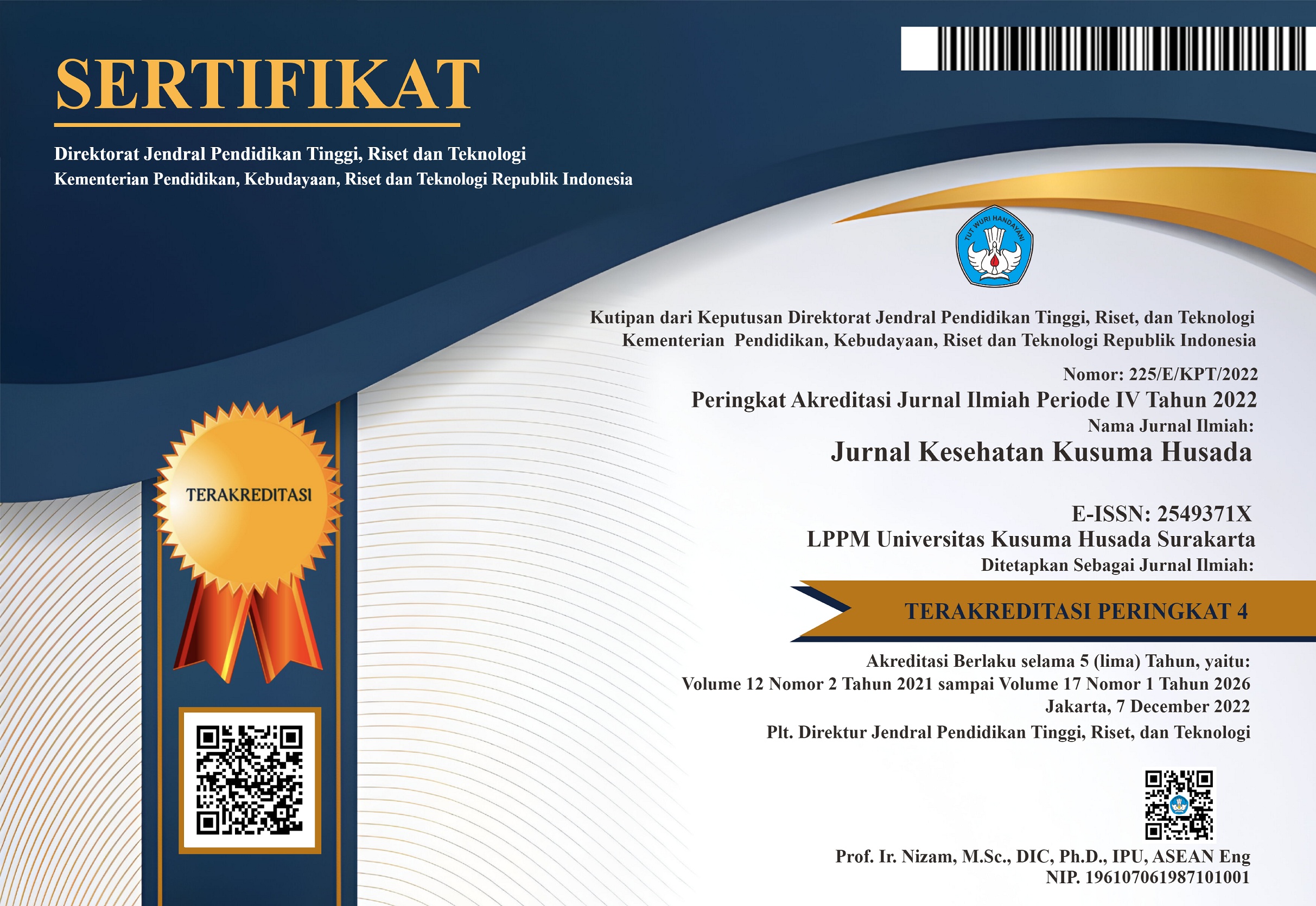MODIFIKASI PERILAKU PERIKSA PAYUDARA SENDIRI MELALUI MEDIA KALENDER SADARI
DOI:
https://doi.org/10.34035/jk.v15i1.1252Keywords:
Kalender SADARI, kanker payudara, deteksi dini, BSE calendar, breast cancer, early detectionAbstract
Periksa Payudara Sendiri (SADARI) merupakan cara termurah dan teraman dalam melakukan deteksi dini kanker payudara. Namun, tidak banyak remaja atau wanita yang rutin melakukan SADARI. Oleh sebab itu, diperlukan sebuah pendekatan baru dimana remaja wanita mampu bertanggungjawab dalam manajemen diri perilaku SADARI secara rutin setiap bulan. Pemberian edukasi berbasis Kalender SADARI yang di-follow up selama tiga bulan diharapkan mampu memodifikasi perilaku remaja wanita dalam melakukan SADARI untuk meningkatkan kulaitas hidup mereka dan sebagai langkah dalam deteksi awal kanker payudara. Penelitian ini menggunakan quasi eksperimen dengan pretest-postest control group design. Jumlah sampel sebanyak 94 responden. Teknik pengambilan sampel menggunakan accidental sampling. Responden dibagi dalam kelompok intervensi (48 siswa) dan kelompok kontrol (46 siswa). Data dikumpulkan menggunakan kuesioner data demografi, kuesioner perilaku SADARI, dan isian praktik SADARI siswi selama 3 bulan pada Kalender SADARI. Hasil penelitian menunjukkan tidak ada perbedaan yang signifikan antara kedua kelompok (p=0.078), namun responden pada kelompok intervensi maupun kelompok kontrol secara konsisten melakukan SADARI selama tiga bulan berturut-turut. Dari hasil penelitian ini diharapkan pihak sekolah dapat memberi program pendidikan bagi siswa tentang pentingnya melakukan SADARI untuk memfasilitasi pencegahan dan deteksi dini kanker payudara melalui kalender SADARI.
Breast Self-Examination (BSE) is the cheapest and safest way to detect breast cancer early. However, not many teenagers or women regularly do BSE. Therefore, a new approach is needed where young women are able to take responsibility for self-management of BSE behavior on a regular basis every month. Providing education based on the BSE Calendar which is followed up for three months is expected to be able to modify the behavior of young women in carrying out BSE to improve their quality of life and as a step in early detection of breast cancer. This research used a quasi-experiment with a pretest-posttest control group design. The total sample was 94 respondents. The sampling technique uses accidental sampling. Respondents were divided into intervention groups (48 students) and control groups (46 students). Data was collected using a demographic data questionnaire, a BSE behavior questionnaire, and filling in female students' BSE practice for 3 months on the BSE Calendar. The results showed that there was no significant difference between the two groups (p=0.078), but respondents in the intervention group and control group consistently performed BSE for three consecutive months. From the results of this research, it is hoped that schools can provide educational programs for students about the importance of doing BSE to facilitate the prevention and early detection of breast cancer through the BSE calendar.
References
Downloads
Published
Issue
Section
License
Copyright (c) 2024 Jurnal Kesehatan Kusuma Husada

This work is licensed under a Creative Commons Attribution 4.0 International License.
The copyright of the published articles belongs to Jurnal Kesehatan Kusuma Husada.

This work is licensed under a Creative Commons Attribution 4.0 International License.
















